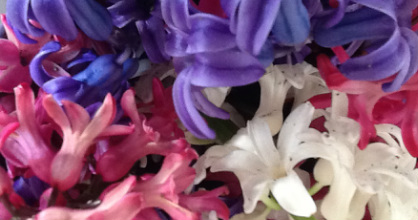I love hyacinths. They're among the first to announce spring, their color is intense, and the fragrance puts me in the mood for spring weeding in my garden. Naturally, I wanted to research their historical significance.
Hyacinths were named after a Greek youth, Hyacinth, who threw the discus with with Apollo. The story reports that the discus was pulled off course and killed Hyacinth. Apollo created the flower from the slain youth's blood. It is a symbol of re-birth.
Hyacinths are not recommended for herbal home use. I had to go back to Culpepper's Herbal to find even a mention of their use. The slimy root juice was decocted to "promote the urine." Culpepper warns, however, that the fresh roots are poisonous and extreme caution is to be used when working with it.
Hyacinths, in Shakespeare's time, was a simple wild flower with a few blooms running up the stalk. Later, during the 18th century, the Dutch developed the flower we have today. It's known for the dense blooms that encircle the entire stalk.
The hyacinth is not assigned to any planet.
Today we the bulbs contain oxalic acid, which can irritate the skin. When handling the bulbs, gloves are recommended for those with sensitive skin. Never allow pets to eat the bulb, which will sicken and perhaps kill them.
Hyacinths were named after a Greek youth, Hyacinth, who threw the discus with with Apollo. The story reports that the discus was pulled off course and killed Hyacinth. Apollo created the flower from the slain youth's blood. It is a symbol of re-birth.
Hyacinths are not recommended for herbal home use. I had to go back to Culpepper's Herbal to find even a mention of their use. The slimy root juice was decocted to "promote the urine." Culpepper warns, however, that the fresh roots are poisonous and extreme caution is to be used when working with it.
Hyacinths, in Shakespeare's time, was a simple wild flower with a few blooms running up the stalk. Later, during the 18th century, the Dutch developed the flower we have today. It's known for the dense blooms that encircle the entire stalk.
The hyacinth is not assigned to any planet.
Today we the bulbs contain oxalic acid, which can irritate the skin. When handling the bulbs, gloves are recommended for those with sensitive skin. Never allow pets to eat the bulb, which will sicken and perhaps kill them.


 RSS Feed
RSS Feed
